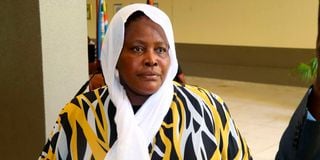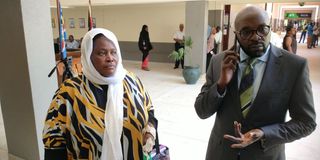
Businesswoman Anne Njeri Njoroge at the Mombasa Law Courts on November 14, 2023.
| Wachira Njoroge | Nation Media GroupNews
Premium
Anne Njeri: My four days of horror
What you need to know:
- In a press interview, Njeri recounted her four days of torture at the hands of people she claimed were police officers.
- The masked officers urged her to calm down, assuring her that nothing bad would happen to her.
- Njeri said the officers warned her not to tell lies, warning that it could cost her her life.
The businesswoman at the centre of the Sh17 billion diesel controversy resurfaced on Tuesday, alleging four days of kidnapping and torture as she accused the government of putting her through a painful ordeal.
Accompanied by her lawyers Cliff Ombeta and David Chumo, the frail-looking Anne Njeri Njoroge entered the courtroom and sat calmly.
However, after waiting for about 45 minutes, Njeri and her legal team left the courtroom when they realised that their case was not on the court's docket.
In a press interview, Njeri recounted her four days of torture at the hands of people she claimed they identified themselves as police officers.
She described how, after giving her statement at the Directorate of Criminal Investigations (DCI) headquarters, she was told to go to another office to write a second statement.
"When I arrived at this office, I discovered that it was not an office. I was met by two people who asked me to bring my medication," she said.
She asked about the connection between her medication and the statements, but was told that they were going on a trip to an undisclosed location.
She was then ordered to hand over her phone and give up her passwords.
"I asked them why they were isolating me from my lawyers, but they replied that it was none of their business," she recalled.
She was then quickly led into a waiting vehicle. By then it was already dark.
The vehicle then sped off in the direction of Kiambu.
"I kept asking them where they were taking me, but they kept assuring me that everything was fine. I begged them not to harm me, stressing that I had a family that depended on me and that I had not stolen from anyone but had earned my living through hard work," she said.
Despite this, the masked officers urged her to calm down, assuring her that nothing bad would happen to her. After a while, she said, the vehicle left the tarmac road and entered a murram road, and the journey continued for several minutes.
"I reminded the policemen that they too had families waiting for them at home, so they should spare my life. All the while, I kept invoking the name of Jesus, even asking for His forgiveness and blessings for the officers. They told me not to worry," she said.

Businesswoman Ann Njeri Njoroge at the Mombasa Law Courts on November 14, 2023.
After some time, the vehicle stopped and the officers instructed her to use her clothes to blindfold herself before they helped her do so.
They then took her into a building.
As she was blindfolded, she was unable to describe the outside of the house.
"Once inside, a mattress was placed on the floor and I was told to sit on it. I was then chained. They demanded the truth about the Sh17 billion oil," she said.
Njeri said the officers warned her not to tell lies, warning that it could cost her her life.
"They said I would never see my children again if I dared to give false information. I assured them that my statement to the DCI was true and that I would stand by it," she recalled.
Realising that she was adamant, the woman said the officers left, telling her to be ready to give them her final decision on their investigation when they returned the next day.

Businesswoman Anne Njoroge arrives at the Mombasa Law Courts with her lawyer Cliff Ombeta on November 14, 2023.
"They asked me to choose between staying there forever or facing death. I told them it was okay and then they left," she said.
She mentioned that the team that had escorted her to the house had left, leaving her with other masked officers guarding the premises.
"I could not see their identities because of their masks. I could only see their eyes. I could not even see their hands. I was afraid of what would happen next because the house had no windows but it was lit," she explained.
During her stay in the house, even being allowed to relieve herself was a privilege.
"During this time, I prayed to God for protection and to spare my life. I begged God to save me because I knew that my time to die had not yet come. I had committed no crime, I was simply importing diesel to make a living," she said.
She recounted a moment when she knocked urgently on the door but received no response.
"Even if you knock on this door, no one will hear you. But there is a CCTV camera in that house. They can see you, but they will not open the door to answer your call when you knock," she said.
The businesswoman said she was forced to urinate on herself because she was under pressure and no one would answer her call to allow her to relieve herself in the toilet.
"After I finished, I went back to the mattress and sat down. In the morning, one of the men who identified himself as an officer came and asked me if I wanted to relieve myself. But I had already done so.
She said that for four days she could not tell what time it was because the room was always dark, except at night when the lights could be turned on.
On the morning of the last day, Njeri said the men, who identified themselves as officers, came and told her to tell the truth or risk being killed.
"I told them that the truth was that the oil was mine and that I had imported it to sell. I told them that I had all the documents relating to the shipment. They said it was fine," she recalls.
She was also told to deny the cargo and leave the country immediately after being released.
According to her, the men, who identified themselves as officers, then left and returned later to tell her that she would be released as she had committed no offence.
"They said the shipment was mine and that they could not kill a woman like me because it was not worth it. I was blindfolded, bundled into a vehicle and driven to Embakasi where I was dumped".
She then contacted her lawyer and took a plane to Mombasa.
During the four days, she said she was given three meals a day, but was initially reluctant to eat, fearing possible poisoning due to the severity of the case. She said she often opted for strong coffee to stay awake, fearing sleep could be fatal.
She was forced to eat to avoid health problems. She was served meat, vegetables and fruit.
According to her lawyers, the businesswoman was threatened to deny the shipments and to withdraw the case she had filed in the Mombasa court. "The consignment is mine, I imported it from Europe," she said.
But when asked where she imported the oil from, the woman could not name the country in Europe where she got the oil, although she maintained that the commodity belonged to her.
She said it was the first time she was importing petroleum products into the country. Ombeta and Chumo have insisted that the case will not be withdrawn and that they will file more documents.
The businesswoman has denied having any agreement with Galana Energies Ltd or that the consignment belonged to the company.
A dispute in which she has sued Galana Energies Ltd, Kenya Ports Authority and Kenya Pipeline Corporation has been set for another hearing where all parties are expected to present their cases.





